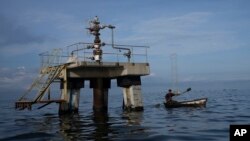Indictment of Oligarchs a How-to Guide to Avoid US Sanctions
It was a deal that brought together oligarchs from some of America’s biggest opponents.
“Money is the key,” the oil broker wrote in a text message, offering a deep discount on Venezuelan crude oil shipments to an employee who claimed to represent the owner of Russia’s largest aluminum company. “Once you’re ready with cash, we can get to work.”
The notice was included in a 49-page indictment unsealed in federal court in New York on Wednesday, accusing seven people of buying sensitive US military technology, smuggling oil and laundering tens of millions of dollars on behalf of wealthy Russian businessmen.
The candid conversation between the co-defendants reads like a guide to circumventing US sanctions – complete with shell companies in Hong Kong, bulk cash pickups, phantom oil tankers and the use of cryptocurrency to obfuscate transactions illegal under US law
It also sheds light on how wealthy insiders from Russia and its ally Venezuela, both locked out of the Western financial system, are colluding to protect their vast fortunes.
Two Russians
At the center of the alleged conspiracy are two Russians: Yury Orekhov, who used to work for a US-sanctioned public aluminum company, and Artem Uss, the son of a wealthy governor allied with the Kremlin.
The two are partners in a Hamburg, Germany-based company that trades in industrial equipment and commodities. Prosecutors claim the company was a hub to circumvent US sanctions first imposed on Russian elites after the 2014 invasion of Crimea. Both were arrested in Germany and Italy respectively on US charges of conspiracy to violate sanctions, money laundering and bank fraud.
On the other end of the deal was Juan Fernando Serrano, the CEO of a commodities trading startup called Treseus, with offices in Dubai, Italy, and his native Spain. His whereabouts are unknown.
In electronic communications among men over the past year, each side has boasted of its connections to powerful insiders.
“This is our parent company,” Orehkov wrote to Serrano, including a link to the aluminum company’s website and a link to the owner’s Wikipedia page. “He’s also under sanctions. That’s why we’re acting from this company.”
Serrano, not to be outdone, replied that his partner was also sanctioned.
“He is one of the most influential people in Venezuela. He is very close to the Vice President,” he wrote, posting a link with search results for a Venezuelan lawyer and businessman wanted by the US for money laundering and bribery.
The alleged partner in the case has not been charged, nor are they named in the indictment. Also, it’s not clear what ties, if any, Serrano really has to the Venezuelan insider he cited.
The partners
But the description of the Russian billionaire fits that of Oleg Deripaska, who was indicted in a separate sanctions case in New York last month. Some of the proceeds he allegedly funneled to the US were intended to support an Uzbek track and field athlete at the Olympics while she gave birth in the US
Meanwhile, Venezuelan media tycoon Raul Gorrin, someone close to US law enforcement officials, spoke on condition of anonymity to discuss an ongoing investigation. Gorrin remains in Venezuela and is on the US Immigration and Customs Enforcement Most Wanted List for allegedly developing a plan to siphon $1.2 billion from PDVSA, Venezuela’s state oil company.
A US-based attorney for Deripaska did not respond to requests for comment. Gorrin declined to comment but dismissed other criminal charges against him as politically motivated.
While U.S. sanctions on Venezuelan oil only apply to Americans, many foreign companies and individuals doing business in the U.S. steer clear of transactions involving the OPEC nation for fear of being sanctioned themselves.
For the same reason, Venezuela’s oil is being sold at a deep discount – about 40% below the market price, according to the indictment. But such choice notions require some unorthodox maneuvers.
For example, instead of transferring funds instantly through western banks, the payment has to take a more cumbersome route.
oil tanker
In one transaction earlier this year cited in the indictment — the purchase of a $33 million tanker carrying Venezuelan fuel oil — the alleged co-conspirators discussed transferring payments from a Dubai front company called Melissa Trade to Shell accounts in Hong Kong, Australia, forward and England. To disguise the transaction, documents were allegedly forged to describe the cargo as “whole green peas” and “large paddy rice.”
But as is often the case with clandestine transactions, cash seems to have been king.
“Your people can go straight to the PDVSA with one of my associates and pay directly to them. There are 550,000 barrels… to load on Monday,” Serrano Orekhov wrote in a November 2021 message.
There was also talk of dumping millions in cash at a bank in Moscow, Evrofinance Mosnarbank, owned by PDVSA. It was a key channel for trade with Russia until it was hit by US sanctions in 2019. The two defendants also considered a possible mirror transaction in which cash delivered to a bank in Panama would be paid out on the same day at a branch of the same name institution in Caracas, the capital of Venezuela.
But Orekhov’s payment method of choice seems to be Tether, a cryptocurrency that claims to be pegged to more stable currencies like the US dollar.
Not only financial transactions are a challenge. Shipping the crude oil comes with its own risk, as most shipping companies and insurers don’t do business with Venezuela and other sanctioned companies. In recent years, the US government has seized several tankers suspected of transporting Iranian fuel bound for Venezuela.
To disguise the oil’s origins, Orekhov and Serrano discussed instructing the Vietnamese tanker they were using to turn off its mandatory tracking system to avoid being spotted loading at “Disneyland” — a coded reference to Venezuela.


